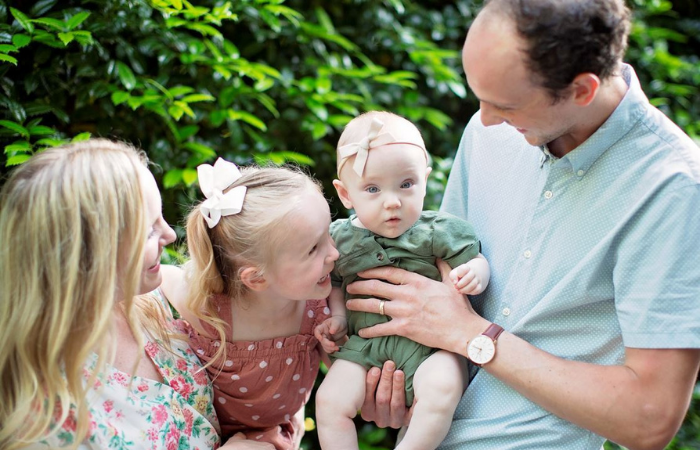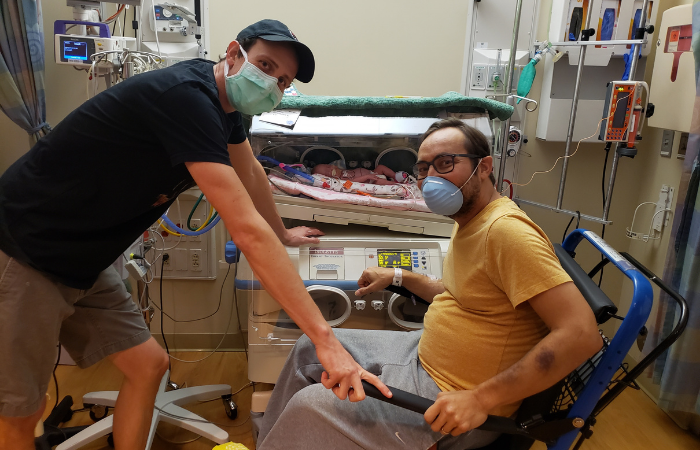
UAB Medicine clinicians take pride in the excellent care they provide for patients and families. In 2020, employees Kacy and Daniel Tucker got an up-close view of that care – this time from the patient side. An organ transplant surgery and the premature birth of their child at the same time are not what the Tuckers would have planned, but the family now reports good outcomes for both experiences.
Kacy Tucker, CRNP, is a nurse practitioner with UAB Medicine Hematology and Oncology. Daniel Tucker, PA, is a physician assistant with the UAB Comprehensive Transplant Institute (CTI) kidney transplant program. As health care professionals, the couple have plenty of insight into the challenges patients face when a medical emergency arises. The Tuckers saw this mainly from the provider side, but they gained a new perspective when certain events coincided in summer 2020.
These events began with preparations for organ donation. Daniel’s brother, Josh Tucker, needed a kidney. Josh, 36, a professor in the English department at Chattanooga State Community College, already had two transplants: the first when he was seven years old and again when he was 18. Josh says this third transplant was more urgent.
“We knew that my kidney was on its way out, so to speak,” Josh says. “I was on dialysis. My grandfather was the donor for my first transplant when I was a child, since he was a match. But even though Daniel and I have the same blood type, he was not a match for this third transplant. But UAB’s Kidney Paired Donation Program was a solution for that.”
Another Option
Josh is referring to a special type of living-donor transplantation. Normally, living donation involves a healthy individual donating a kidney to someone in need of a transplant. The living donor may be a relative, spouse, or even a close friend of the recipient. However, as was the case for Daniel and Josh Tucker, sometimes tests show that a kidney would not be a match, meaning that certain medical factors regarding tissue type and antibodies will cause the recipient’s body to reject the new organ. This is known as donor-recipient incompatibility. In such cases, kidney paired donation (KPD), sometimes called kidney exchange or kidney swap, becomes an option that can address the shortage of organs.
Through KPD, living donor kidneys are swapped, so that each recipient receives a compatible transplant. This is an option if a living kidney donor is incompatible with the recipient but happens to be compatible with another person on the waitlist. Two living-donor transplants are performed, involving a first donor and recipient and a second donor and recipient. Donor 1 gives a kidney to recipient 2, then donor 2 gives a kidney to recipient 1.
With this arrangement in place, Daniel and Josh would wait for a call informing them that a paired donor match had been found. Although the COVID-19 pandemic created new risks for patients and complications for hospital procedures in 2020, Daniel was not greatly concerned about outcomes. He works with kidney transplantation at the CTI every day. The center has performed more living-donor kidney transplants than any other kidney program in the United States and was the first in the southeast to begin using KPD. The difference was that Daniel would experience all of this from a patient’s perspective.
“It helped knowing the staff, because in some ways I wished I did not know about the possible complications,” Daniel says. “This is where I work, and I fully trust my colleagues here. I’ve seen their expertise and how they care for patients, so I knew Josh and I were in good hands.”
‘How Do I Become a Patient?’
Kacy was pregnant at the time Daniel and Josh were making preparations for the donor swap. In July, she suddenly went into labor. She recalls the shock of that day.
“We don’t know why, but I went into labor at 22 weeks and 2 days, which is dangerously early,” Kacy says. “I was at work that day, so I headed straight to the Emergency Department. I didn’t know how to get in from the patient side, so I just badged in and asked someone, ‘How do I become a patient?’ They got me to the UAB Women & Infants Center. I was put on bed rest. The care team tried to prolong my pregnancy and stop labor, and did have some success, so Lucy was born on July 6 at exactly 23 weeks.”
Kacy and the care team had hoped to extend her pregnancy, mainly because delivery at 23 weeks is a high-risk situation for infants. Barely more than half of babies born so early survive. Multiple complications can arise, since babies that young are not prepared to breathe and take nourishment. They are at great risk of infection, lung collapse, pneumonia, bleeding in the brain, and many developmental delays. Good outcomes are rare.
Fortunately for baby Lucy Tucker, she was receiving care from a team of specialists with the Regional Neonatal Intensive Care Unit (RNICU) at the UAB Women & Infants Center. The RNICU is equipped with advanced practices and technology to care for high-risk newborns and provide continuous inpatient care for premature and sick infants. Neonatology and maternal-fetal medicine specialists are immediately available in house around the clock, every day of the year. UAB’s survival rate and rate of survival without handicap for all premature babies are among the highest in the country. The RNICU Golden Week program was designed for very vulnerable, extremely premature infants, such as the Tucker’s baby, to provide specialized and specific care.
Even though Kacy knew her baby was in the best possible place during a crisis, she recognized the challenges ahead.
“As far as her hospital course goes and considering the circumstances, Lucy had the easiest stay she could have had,” Kacy says. “There were no surgeries, and she made a little progress each week. Lucy was there for 119 days, so there were a few scares. The worst was when her breathing tube became so clogged that her oxygen saturation dropped, and CPR was required. The care team replaced her breathing tube. She began to develop retinopathy, which is sometimes caused by oxygen therapy for infants. We were praying that she wouldn’t get any infections, and of course the pandemic added to those worries.”
A Successful Complication
Lucy continued to make developmental progress, eat and gain weight, and require less oxygen flow in her breathing tube. After a while, Lucy no longer required oxygen therapy. Daniel and Kacy weren’t able to hold their baby until Lucy was three weeks old. The staff are skilled at providing opportunities for parents to be close and bond with their babies despite technical barriers.
A short time later, Daniel and Josh learned that a donor match had been found. Kacy remembers the feelings the family shared about the timing of these medical events.
“Daniel jokingly prepared me that we were going to get a call about a donor match while I was in the hospital on bed rest,” Kacy says.
The Tuckers received that call three weeks after Lucy was born, and Josh was concerned about the sudden turn of events.
“There were multiple times I told Daniel that if he wanted to wait for things to improve for their new baby, then it certainly wouldn’t hurt my feelings,” Josh says. “When you have a living donor, that option is there, because you don’t have an organ in a case with the clock ticking. I figured we would wait and see how Lucy was coming along, because this was a tremendous stress on the family. But Daniel wanted to proceed.”
The transplant on Sept. 3, 2020, was a success. Today, Josh reports that he has a healthy, fully functioning kidney and that his creatinine levels (a measure of how well the kidneys filter blood) are the lowest they have ever been.
An Inspiration to All
Kacy and Daniel could visit and hold Lucy, read to her, and talk to her each day during the hospital stay at the RNICU and the Continuing Care Nursery. They juggled those precious moments with their own clinical work, caring for their other daughter, and a kidney transplant surgery — all during the peak months of a pandemic.
Members of the Tucker family’s care teams at both the NICU and the CTI express astonishment at the family’s courage and strength in facing these challenges during Lucy’s 119-day hospital stay. Jayme Locke, MD, Director of the UAB Comprehensive Transplant Institute, sees the Tucker family experience as an example of hope for others in need of organs.

“The extraordinary acts of generosity our living kidney donors display quite literally provide the gift of life to the patient with end-stage kidney disease,” Dr. Locke says. “Importantly, it also gives patients and families hope for a future that, prior to transplantation, was uncertain. Seeing this gift realized between two brothers, the love, the dedication — it was and remains an inspiring experience for our staff and community.”
Amy Freeman, MD, is completing a three-year neonatology fellowship at UAB. She and the attending physician, Vivek Lal, MD, helped care for Lucy while she was in the RNICU. Dr. Freeman says she recalls Kacy and Daniel persevering through good and bad days.
“I remember seeing them at bedside daily, both before and after their work shifts at UAB, talking to and reading to Lucy,” Dr. Freeman says. “While Lucy showed a remarkable tenacity during her course, I believe the unconditional support provided by the family played a large role in her progressive improvement. During Lucy’s admission, Daniel and Kacy became integral members of our care team each day during rounds. Their perseverance, selflessness, and strength continue to provide inspiration for the entire RNICU team and me.”
Bad Year, Good Outcomes
When Lucy went home on Nov. 1, 2020, Kacy noted that this happy occasion took place one day before her original due date. By that time, the family had settled back in to a mostly normal life, and Daniel says he fully understands what it means to have excellent care available when needed.
“You can’t really appreciate it as much maybe until you’re on the receiving end,” Daniel says. “We are now at the lowest level of stress we’ve had in a while. We could accurately say that that 2020 was the worst year of our lives together, but we don’t think of it that way. We see the happy ending. It was a bad year with incredible outcomes.”
Kacy says their experiences are a reminder to be grateful.
“One of the attending physicians encouraged us, back then, that all of this would one day be a distant nightmare,” Kacy says. “But now, what we think about is how incredibly fortunate we have been. Josh has a good kidney. Lucy is healthy. We owe it to the providers who guided us through so many decisions and questions. To the RNICU’s sweet, amazing nursing staff who gave Lucy loving care in our absence. To all the specialists and therapists and support staff. Lucy was in big trouble on the day she was born, but now she is meeting all of her milestones and showing no signs of delayed development. She’s feisty, too. Lucy is at the stage where she’s supposed to be walking. Well, she’s running now.”
Legacy of Hope (formerly the Alabama Organ Center) recognizes National Donate Life Month each April to raise awareness about organ donation. To register as a donor or learn more about Legacy of Hope, click here.
To learn more about the UAB Comprehensive Transplant Institute, click here.
